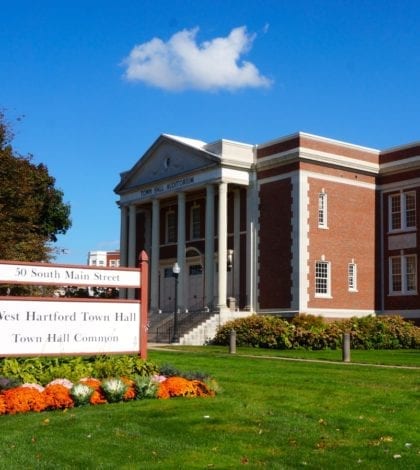[Updated] West Hartford Will Get $24 Million in State Aid from Bipartisan Budget Deal

Audio By Carbonatix

West Hartford Town Hall. Photo credit: Ronni Newton
[Updated, Oct.27] After nearly four months without a budget, and several weeks operating under Gov. Dannel Malloy’s executive order, the Connecticut legislature has passed a veto-proof budget.
By Ronni Newton
The state of Connecticut’s long-running budget impasse has finally come to an end, and for West Hartford the result is a total aid package of just over $24 million in the current fiscal year.
The stalemate ended with passage of a bipartisan budget in the early hours of Thursday morning by the State Senate, and Thursday afternoon by the State House, both by margins large enough to override a veto by Gov. Dannel Malloy, who was left out of the negotiations. The Senate vote was 33-3 in favor of the budget, while the House approved it 126-23.
The overall aid package for West Hartford in FY 2018 is a reduction of $1.575 million (6 percent) from what the town received in FY 2017, but the reduction is much less onerous than some of the other budget plans that were released over the past six months.
In FY 2017, West Hartford’s total state aid package was $25,634,623, of which $21,096,924 was Education Cost Sharing (ECS). The total aid package for FY 2018 will be $24,060,063, of which $19,913,284 is ECS.
In the town’s adopted Fiscal Year 2018 budget, a total of $27,586,949 in state aid formula grants was assumed, but the town included in that a built-in $7 million contingency to offset any shortfall from the year prior, leaving a general fund impact of $20.5 million. With the addition of other state funding of Adult Education and LoCIP, total state aid was assumed at $20,659,091.
The town will see an actual impact to the general fund of $26,340,478 under the approved budget, based on formula grants, other state aid and the ability to issue supplemental car taxes at 37 mills, should the Town Council decide to do so. This reflects a total increase in revenue of $5,681,387, or 28 percent from the town’s adopted budget assumption of total state aid.
The initial governor’s plan was that car taxes were to be capped at 32 mills, but the town was to receive a grant to offset revenue lost. That grant no longer exists, but under the General Assembly budget, car taxes can be increased to 39 mills, though West Hartford anticipates in its preliminary analysis that if supplemental car tax bills were to be issued it would be at 37 mills and generate an increase of $2,280,416 in revenue.
During a Finance and Budget committee meeting held the morning of Oct. 27, Director of Finance Peter Privitera said supplemental bills would be issued in January if the Council decided to go that route.
Republican Council member Chris Barnes urged his colleagues to look for ways not to issue the supplemental bills.
Mayor Shari Cantor said that option would certainly be considered, but also raised the fact that car taxes were at 37 mills last year and would likely be 37 mills again next year, so a drop this year could make budgeting difficult for residents.
“There’s something to be said for stability,” she said.
She added that before a decision is made on the car tax, she’d like Privitera to speak with the town’s financial advisor to get a recommendation because taxes are the town’s primary source of revenue.
Mayor Shari Cantor praised town staff for cautiously budgeting in the midst of the state budget crisis and said she is happy with the agreement reached by the General Assembly.
“We protected our award winning public schools, we protected town services including libraries and senior centers while we planned and budgeted for reductions in a variety of state aid. Throughout this protracted state budget process we fought for our fair share of state support – primarily for public education,” she said. “We are very pleased that this bi-partisan budget that passed the legislature contributes fairly to our vibrant and diverse inner ring suburb. The overwhelming bi-partisan support for this budget provides for stability and eliminates the cloud of uncertainty that hurts all communities in the state of Connecticut. We urge the governor to sign this bill so we can all move forward.”
State Sen. Beth Bye said that while she doesn’t think this budget is perfect, its passage was critical in moving the state forward.
“The ECS formula is much improved over the governor’s proposal,” Bye said following the Senate’s 33-3 approval of the plan early Thursday morning.
Several of the spending plans proposed by Malloy drastically cut, or completely eliminated West Hartford’s ECS funds. She is pleased that the budget supports state funding for towns and schools, as well as for college scholarships.
“It supports our community with appropriate funding levels and the formula makes sense for West Hartford going forward. That was critical,” said Bye. “It wasn’t just about this year and next year. It was really important that we address the formula for the long term education funding for West Hartford, and this budget does that.”
Bye said that West Hartford is receiving more through this budget than anticipated, and credited Cantor with being a good advocate for why the diverse town needs the state’s support.
Since Oct. 1, the state has been operating under Malloy’s executive order, which eliminated all ECS money for the town.
“This budget is balanced, bipartisan, and it supports West Hartford’s schools and property taxpayers,” State Rep. Derek Slap said Thursday. “For months I have been advocating for such an approach – understanding that it would require compromise on important issues in order to end the stalemate.”
Slap said he is pleased that the final product is a budget avoids the “mistakes and gimmicks of the past” that contributed to the state’s massive deficit.
“To be sure, the process took too long. But it is my hope that the bipartisan spirit that grew out of this will take root next session and beyond,” Slap said.
Looking at the big picture, Bye said in a statement, “This budget provides funding for critical human and social services, services like early childhood education. But this budget also raises taxes on our lower-income citizens by changing the EITC credit. This budget cuts funding for UCONN and the CSU system too much; higher education is our advantage as a state. This budget cuts funding to CEN and OSB, which hurts economic development efforts to improve Connecticut’s broadband infrastructure.”
Bye said that while she looks forward to some of the shortcomings being revisited in the legislature’s next session, “For now, we move forward with a budget for the citizens of Connecticut.”
Abigail Albair, Executive Editor of the West Hartford Press, contributed to this story.
Like what you see here? Click here to subscribe to We-Ha’s newsletter so you’ll always be in the know about what’s happening in West Hartford!



